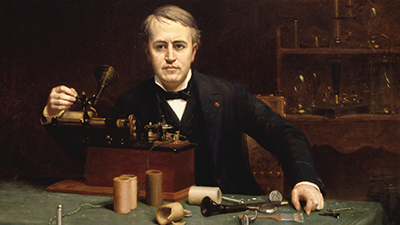Technology of the Industrial Age
Teacher Resources
Driving Question: How did industrial innovations transform economic production over time?
The Industrial Revolution transformed every corner of the globe, reshaping networks, communities, and production and distribution. That transformation was largely due to the technological advancements of this period. This lesson focuses on the impacts of industrialization and, specifically, how those technological advancements affected people economically and socially.
Learning Objectives
- Describe how innovations made possible by the Industrial Revolution changed the movement of goods and people.
- Explain how technology shaped economic production over time.
Vocab Terms:
- fossil fuel
- infrastructure
- innovation
- locomotive
Opener: Technology of the Industrial Age
To teach this lesson step, refer to page 3 of the Lesson 5.5 Teaching Guide.
The Comparison One-Pager is a great reminder of why this skill is so important to understanding the past.
Have you ever thought about what differentiates technology and innovation? What is the relationship between those two terms?
Innovations and Innovators of the Industrial Age
To teach this lesson step, refer to page 4 of the Lesson 5.5 Teaching Guide.
Looking for supports to scaffold articles for your students? Pages 3-5 of the OER Project Reading Guide provides a wealth of ideas.
From the steam engine to the light bulb, the inventions that emerged from the minds of innovative thinkers during the Industrial Revolution changed our lives today.
-
Guiding Questions
-
Before you read
Preview the questions below, and then skim the article. Be sure to look at the section headings and any images.
While you read
Look for answers to these questions:
- Why was the Watt engine such an important innovation?
- What was one unexpected (and negative) impact of the cotton gin?
- How did Louis Pasteur change how we think about, and treat, diseases?
- Why is Thomas Edison an important inventor?
After you read
Respond to the following question:
- This article introduces several key inventions of the Industrial Revolution. Each of these changed life on this planet. Which innovation had the most important impacts for our networks? What about communities and production and distribution?
The Railroad Journey and the Industrial Revolution: Crash Course World History #214
To teach this lesson step, refer to page 5 of the Lesson 5.5 Teaching Guide.
The OER Project Video Guide provides great information on best practices for using video in the classroom.
Railroads helped spread the Industrial Revolution—and in the process, changed our notions of time and space.
-
Guiding Questions
-
Before you watch
Preview the questions below, and then review the transcript.
While you watch
Look for answers to these questions:
- How did widespread railways help bring the Industrial Revolution to more people?
- How did railroads shape our ideas of space and time?
- What were some arguments that people in the long nineteenth century used against railroads?
- What effect does John Green argue industrialization had on our worldview about progress?
- How does John Green argue that the internet is like the railroad?
After you watch
Respond to the following question:
- Do you agree with John Green that railroads changed the way that humans think about time and space? How do your ideas about time and space change if you’re walking, driving, or flying to a place?
Key Ideas
Assembly Line Simulation
To teach this lesson step, refer to page 6 of the Lesson 5.5 Teaching Guide.
The Assembly Line Simulation is a great hands-on activity. Read about how other teachers have approached this activity in the Community Forum.
Have you ever wondered what it would be like to work in manufacturing? Well, now is your chance through this simulation activity. Find out firsthand the positive—and negative—effects of industrialization!
Closer: Technology of the Industrial Age
To teach this lesson step, refer to page 9 of the Lesson 5.5 Teaching Guide.
You’ve learned about a lot of technologies in this lesson that transformed the world. Practice your claim making skills as you argue for the one you think was the most important.
The Life of Nailers
To teach this lesson step, refer to page 9 of the Lesson 5.5 Teaching Guide.
Children used to be seen and not heard. Where were they seen? If they were in Victorian Britain, it was likely they would be seen working as nailers.
-
Guiding Questions
-
Before you watch
Preview the questions below, and then review the transcript.
While you watch
Look for answers to these questions:
- Why would you begin work as a nailer at five years of age?
- How many nails would an eight-year-old girl be expected to make in one hour, and how many hours did they work?
- How did the nail masters cheat the nailers and how much did the nail master usually pay the nailers in wages per week?
- Who was Mary-Ann Bird?
After you watch
Respond to the following questions:
- How does learning about Victorian nailers help you understand the perils of child labor and the power dynamics between the working class and factory-owning industrialists?
Key Ideas
Making Clean Water
To teach this lesson step, refer to page 10 of the Lesson 5.5 Teaching Guide.
Clean water is something many take for granted in the twenty-first century. In Britain during the Industrial Revolution, clean water was not a given. The steam engine would help change that.
-
Guiding Questions
-
Before you watch
Preview the questions below, and then review the transcript.
While you watch
Look for answers to these questions:
- What were some of the issues with drinking water in Britain?
- What system did Thomas Hawksley pioneer?
- Why was the steam engine an essential part of making water clean?
- How did the changes in the production and distribution of drinking water impact the population of Nottingham?
After you watch
Respond to the following question:
- What might be some long-term consequences of improved sanitation?
Key Ideas
Victorian Washing Machines
To teach this lesson step, refer to page 11 of the Lesson 5.5 Teaching Guide.
What can washing machines tell us about class and gender roles in the Industrial Revolution? Quite a lot, actually!
-
Guiding Questions
-
Before you watch
Preview the questions below, and then review the transcript.
While you watch
Look for answers to these questions:
- Why was it important to soak and beat your clothes for at least 30 minutes?
- Why were household chores like the washing done by women and girls?
After you watch
Respond to the following question:
- How does learning about Victorian washing machines help you understand class and gender roles in this era?




